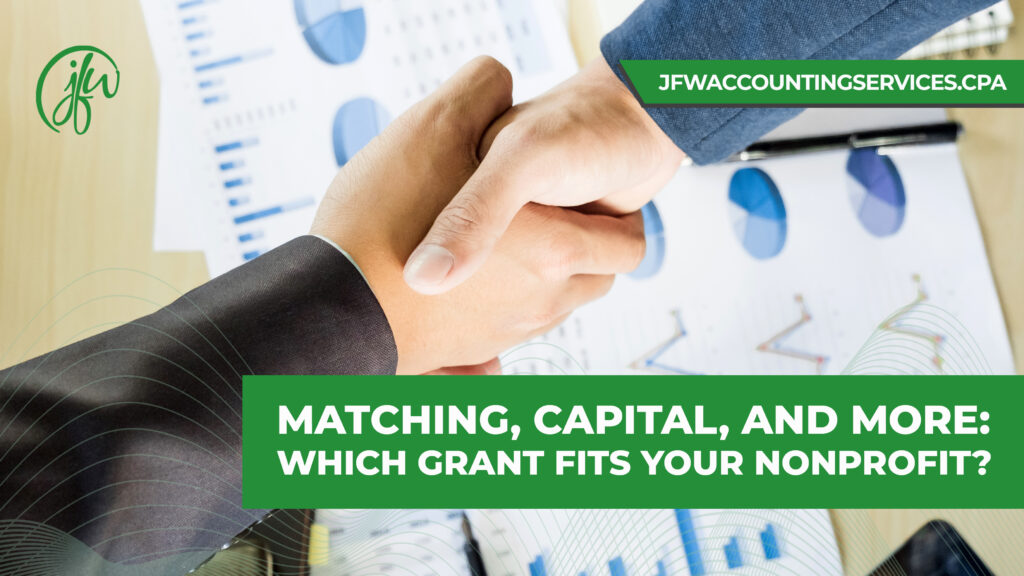For nonprofits to grow and fulfill their charitable missions, grants are necessary. Grants differ from donations, which often come from individuals and can be used more flexibly. With grants, nonprofit organizations have a larger source of funding, that does not require repayment. This allows the nonprofit to focus more freely on their impact and how quickly they achieve their goals.
In this two-part series, we will take you through the ins and outs of grants for nonprofit organizations, beginning with what they are, the various types available, and where you can apply for them.
What Are Grants for Nonprofits?
Nonprofit grants are funds awarded to organizations by foundations, government agencies, private corporations, and other entities that support charitable goals. Again, these funds differ from donations in that they come with specific requirements on how the money must be spent. These grants also differ from a typical loan as they do not need to be repaid and accrue no interest. For nonprofits, grants can provide critical support for their programs and initiatives.
Five Types of Grants for Nonprofits
There are 5 common types of grants for nonprofits, each with its own set of guidelines for usage. Here is a quick breakdown of these grant types and how they provide funding to charitable organizations:
- Project or Program Grants: Provide funds for specific missions such as new nonprofit programs and initiatives.
- Operating or General Support Grants: These provide flexible funding for general operational costs.
- Capital Grants: These grants provide physical assets such as building rentals, organization renovations, and equipment upgrades.
- Capacity-Building Grants: These funds are used to strengthen the internal processes of a nonprofit (personnel, staff training, updated technology, etc.)
- Challenge or Matching Grants: These grants match donations, helping nonprofits raise more money for their mission.
Eligibility Criteria for Nonprofit Grants
There are a few steps a nonprofit must take and criteria they must meet in order to be eligible for a grant. For starters, the organizations will likely need official nonprofit status to even be considered. When applying for these nonprofit grants, charities will also need a mission statement that aligns with the organization supplying the grant. They may also need to meet other factors such as organization size, project scope, and location requirements.
Nonprofits can get a full view of the eligibility requirements necessary for specific grants by exploring sites such as grants.gov. This free, government-run website outlines the specific criteria needed to be eligible for many federal funding opportunities. Other high-profile sources including the National Endowment for the Arts and major private foundations like the Ford Foundation also offer their eligibility criteria right on their websites.
Resources for Nonprofit Grant Searches
Finally, finding grants is much easier with the right resources. Again, a top reliable platform is grants.gov, which lists an abundance of federal grant opportunities for nonprofit organizations. Another reliable source for grants is Candid’s Foundation Directory, which profiles thousands of private foundations.
The journey to finding the right grant can be daunting, but the rewards are significant for nonprofits. By understanding the basics of grants and exploring resources, organizations can lay a strong foundation for securing funding.
Stay tuned for Part 2, where we will teach you everything you need to know about picking the right grant, applying for the funds, and how you can strengthen your chances of grant approval.

Jo-Anne Williams Barnes, is a Certified Public Accountant (CPA) and Chartered Global Management Accountant (CGMA) holding a Master’s of Science in Accounting (MSA) and a Master’s in Business Administration (MBA). Additionally, she holds a Bachelor of Science (BS) in Accounting from the University of Baltimore and is a seasoned accounting professional with several years of experience in the field of managing financial records for non-profits, small, medium, and large businesses. Jo-Anne is a certified Sage Intacct Accounting and Implementation Specialist, a certified QuickBooks ProAdvisor, an AICPA Not-for-Profit Certificate II holder, and Standard for Excellence Licensed Consultant. Additionally, Jo-Anne is a member of American Institute of Certified Public Accountant (AICPA), Maryland Association of Certified Public Accountants (MACPA), and Greater Washington Society of Certified Public Accountants (GWSCPA) where she continues to keep abreast on the latest industry trends and changes.

